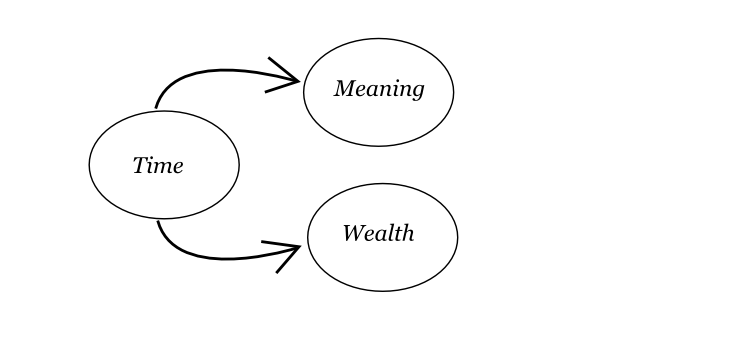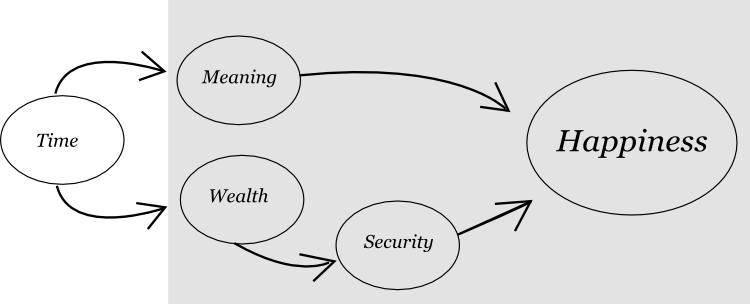Money or Meaning: Spending Our Wealth of Time
This is an extremely rough draft of an essay I started writing several months ago and couldn't figure out how to wire together. I'm posting it anyway, mostly because I like the graphic I made. Whether the meandering flow of the essay itself makes a point is an entirely different matter.
America's impending doom by my narcissistic generation is a legend in the manufacture, and rarely does a week go by without another reporter lamenting young graduates1 or professor painting their delinquent students onto a strawman. Like many distraught citizens, I love reading these stories and decrying their villains. I've even met a few who embody the narcissistic archetype which apparently is the role model for my generation.
Some might suggest I satisfy the requirements myself.
That said, I can't help but chuckle at the thought that narcissism is a grave danger facing my generation. The much greater obstacle is recognizing and avoiding the aged truths which were cornerstones of successes past, but no longer apply to the present. In this essay I'd like to take a look at one of these truths which have deeply integrated into our lives and decisions.
The last fifty years of financial advice is based on the premise of steady and inevitable gains, and has thus far--despite painful hiccups--held firm. However, applying the same economics to spending our lifetimes of time has proven painful.
Time: a Finite Resource
A textbook definition of economics is the study of the allocation of scarce resources. Even if you've never plotted the impact of a price ceiling on a market, if you ever think about goals and have some nebulous life plan, then you are an economist. You're an economist because you're allocating your scarcest resource: time.

Time is important because it is a necessary ingredient for creating both wealth and meaning (one might imagine that time is important for other reasons as well). In turn, wealth and meaning are the two substances that American society values above all else. While we may not spend much time considering why these two substances are valuable, we certainly have a growing niche of wealth and meaning alchemists who have discovered the art of turning vapid advice into gold by way of the printing press2.
Skipping past the snake oil (it's poison) and the snake oil dealers (selling advice on making money is the only surefire way to make money), the formula we've been taught for wealth creation is pretty mundane.

This formula is the juxtaposition of old Protestant beliefs and new American ideals into a quantum of wisdom. The moral that underpins all three of the ingredients (education, effort and time) is the neo-American value that rules them all: fairness3.
The theory goes something like this:
- Education is a great equalizer which gives us all a foundation for success.
- Effort is something that anyone can marshall.
- Time is limited for everyone.
Thus, by that formula, as long as education is widely available, wealth is equally available to everyone. That is to say, the accretion of wealth is a fair and predictable process. There is just one nagging problem: it isn't.
Education is widely available, but it is increasingly expensive, and the benefits have shifted from intrinsic to extrinsic. Where--in our parents' generations and before--the benefit of education (in particular of the undergraduate and graduate variety) was about learning skills and domains of knowledge, in many careers a college degree is a mandatory entrance requirement (it serves as an easy to implement filter of applicants) but is otherwise ignored.
The catchphrase for explaining this phenomenon is that you go to college to learn how to learn. This strikes me as an infuriating excuse for why so many students come to college and leave four to six years later without any usable skills or directly applicable knowledge.
Looked at from the lens of the past--where education's primary value was intrinsic--the explosion of college and pursuant increase of college educated students seems like fairness spreading its wings. It's a bit different when viewed from a perspective where college's primary benefit is extrinsic. In the best case we achieve the dangerous fairness of uniformity, and at worst the system is actively punishing those without the means to finance their college education by straddling them with debt that's exempted from bankruptcy4. Instead of opening a world of opportunities, attending college is often the event horizon past which awaits debt mandated employment.
According to a somewhat prevalent mindset, effort as an unlimited resource, which we can tap to the extent that we try to tap it. That is to say, we can exert effort to the extent that we put effort into exerting effort. While this is a comfortable lie to those of us who are blessed with good physical and mental health, but simply isn't true. Long term stress caused by financial insecurity and depression can both undermine the brain's functioning.
Even--which is to say, especially--the most dedicated of workers can and will experience burnout during particularly trying times. The body and the mind will protect itself from yourself, and burnout is one surefire mechanism it uses to prevent extended periods of overwork.
Time is, in one sense, the most egalitarian of the three ingredients, but demands upon--and thus opportunity of--time vary greatly between individuals. To some extent we do have a large degree of control over how we utilize our time, but some individuals have more than others.
The wealthy family who has hired a nanny and a gardener can devote time to work that would otherwise be invested in picking up kids from school or cleaning up the yard. For those who would argue that having a home or a child is a choice, I would argue there are comparable demands upon time that can only be avoided at great personal cost or cannot be avoided at all: relatives with chronic disease, unemployed friends or family, personal injury.
Meaning: Failed By Our Alchemists, We Flounder
Unfortunately, even if we acknowledge the wealth formula as a flawed construct, with that realization decisions don't become any simpler. Rather, just like a novice programmer just beginning to understand threading), the understanding opens the doorway to a new mess of confusion.

Whereas we have a formula--however broken--for wealth, our happiness algebra is notably lacking. One suggested formula is
- Have a job you love (which pays well, offers long-term growth, is meaningful).
- Start a family (i.e. spouse and two children).
- Buy a house (with a yard).
It's a formula which hasn't aged particularly well. Sure, house prices are rather out of reach as opposed to our parents' generation, but moreover I think it's lost its psychic cachet.
Owning a house and raising a family is much more pleasant when one parent can support the family adequately. Raising kids at all is much more pleasant when you're part of a strong and intact community.
Another common formula is do something you love. That's it. That's like telling a 16th century sailor to navigate by sailing straight. Great. Thanks guys, I'm going to do that, right now.
Security: the Value of Wealth
If one can scry a formula for happiness from the entrails of the past, equally important is figuring out the formula for security, which is where the value of wealth becomes apparent.

Then again, wealth is worthless when your needs exceed your wealth, and wealth is worthless to the extent that it exceeds your mental state.
Wealth can't cure unhappiness. Nor can mental state cure poverty. Nor will reducing your financial needs solve this formula. Instead we need to examine our lives and make considered decisions. Stop maximizing wealth when you're unhappy; stop neglecting wealth when poverty keeps your from enjoying it.
Optimize where it counts.

So, our new goal is to spend our lifetime of time to optimize the final happiness equation.

Given the equation, we still need an approach to solving it.
Algorithms for Living
In America we have this dream of college being the golden years before we become productive (and spend much of our time working) and after youth. With the rise of student loans, this college interlude is quite literally paid for by decades spent in the workforce.
After those decades, blissful retirement awaits where you can go on long cruises and buy a timeshare in Florida.

The entrepreneurial vision of living is much more enticing, seemingly offering a much longer portion of one's life devoted to solely to meaning and devoid of the concern of perusing financial security.

Certainly it looks better, but it's only a model. This doesn't always work out, and there are many would-be entrepreneurs who take a long-hard stab at success and then up working for the man or consume their life seeking wealth.
Summarizing Dilapidated Advice
In the end, the half-dozen pseudo-formulas boil down to a few simple thoughts:
We should emphasize creating security, rather than maximizing wealth. This means a balance of mental health and financial health. One without the other is unusable.
Security is essential for happiness, but is an insufficient condition. Pursuing security is an incomplete approach to living.
Advice ages. Sometimes it ages like wine and sometimes like milk. Check for expiration dates.
Security and happiness to all of you.
Didn't you know, only kids who go to college get the great jobs like copying paper at Kinko's or shift-leader at Subway, so it's now acceptable to refer to blame things on graduates instead of just young adults.↩
Although we tend to tacitly accept that advice sellers are selling us things for their benefit rather than for ours, we rather explicitly refused to apply this to stock brokers and financial wizards because the nectar they sold was simply too sweet to refuse. The ongoing legal war against personal responsibility may reassure some, but that siren song ends up with experts subjugated by the layman's subjective opinion and no smidgeon of excellence left unpunished.↩
I think, and at some point I will argue in an essay, that fairness has become the morality of America in a very dangerous way. Historically, American fairness has been of the negative freedom sort, protecting us from certain things, but predominately focused on getting out of the way and letting people achieve.
Recently, fairness has become a very tangible positive freedom, and I think we must view this has a troubling development. The option to be educated replaced by mandatory education, the Hippocratic Oath subjugated by the doctor's moral 'right' to refuse to offer birth control which they disagree with.
I won't belabor the point of fairness in this essay, but suffice it to say that when I speak of fairness it is a heavy word, which is used unironically by those with opposite views. Capitalists speak of fairness when they discuss lowering taxes ("We earned the money, we shouldn't give it up to those who didn't."), and socialists use the same vocabulary when arguing for increased social programs ("It is unfair for some to have so much while others have so little.").
Where the hell did we get this idea that life is fair?↩
I fully understand why education loans are exempted from bankruptcy (all students are bankrupt when they graduate), but that doesn't stop them from being devastating. The educational loan system is a tremendous source of wealth for both universities and the loaners, and creates situations where under-informed individuals form contracts they cannot absolve, don't fully understand, and have no means of paying for.
It is far from clear to me that education loans are the panacea they are framed as. Instead, they seem to be making bank from the plethora of jobs which have outsource human resources decisions to fancy scraps of paper.↩